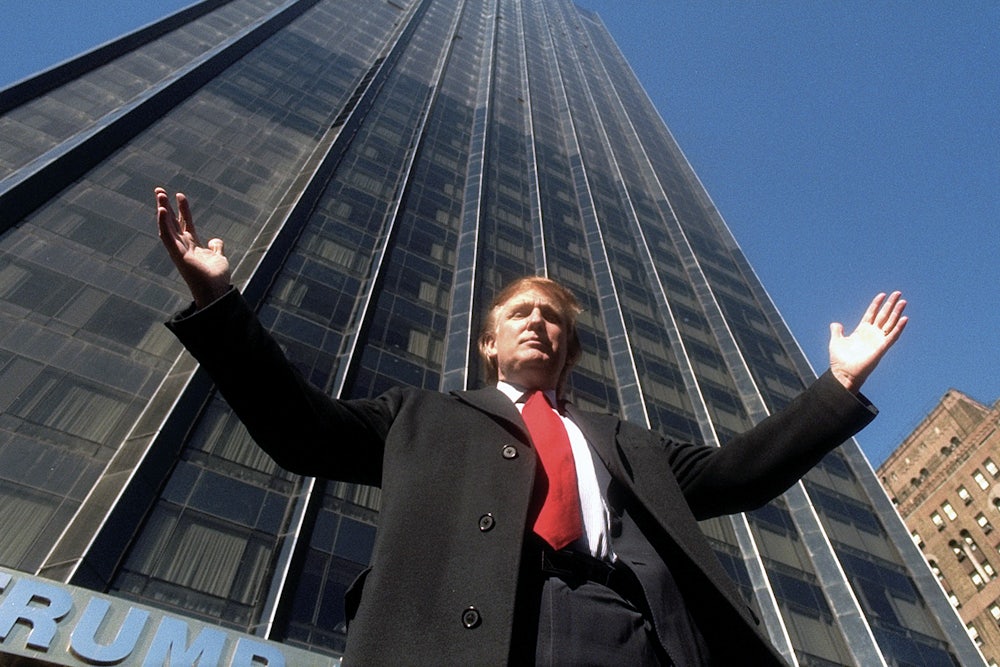Political pundits, staggered by Donald Trump’s exaggerated boasts, false promises, and outright lies, have offered various theories for what’s wrong with him. Does he suffer from mental illness? Is he experiencing early-onset dementia? Andrew Sullivan recently argued in New York magazine that Trump’s chronic, stubborn dishonesty—unlike normal political fibbing—is “delusional” and “deranged,” a frightening sign that the president is living in an alternative universe. “There is no anchor any more,” Sullivan writes. “At the core of the administration of the most powerful country on earth, there is, instead, madness.”
But such dramatic theories miss the simplest explanation for Trump’s lying: He’s a real estate developer from New York City. Lying isn’t a personal failure. It’s a business model.
New York real estate, where Trump first learned the art of the con, is a line of work that’s built on chicanery. Under state law, real estate developers have a de facto legal license to lie, and they use it with abandon. The marketing materials for a luxury condo might advertise top-flight amenities—on-site SoulCycle, say, or valet stroller parking—but buyers have no legal recourse after they move in and discover they have to haul their strollers up six flights like a tenement-dweller; as a matter of New York law, only the final sales contract is binding. And with land values so high and profit margins so slim, developers have every incentive to hype the sales pitch. “Real estate investors sell their product—and in the process, they promise it will have benefits that may not ever be realized,” says Thomas Angotti, a professor of urban planning at Hunter College and author of New York For Sale. Or as one real estate broker and property manager in New York puts it: “Everybody in this business is a fucking liar.”
Bait-and-switch tactics are an everyday practice in Trump’s industry. The real estate mogul Bruce Ratner dangled star architect Frank Gehry before city officials when seeking approval for the arena that would anchor his enormous Atlantic Yards development in downtown Brooklyn. Once the deal was in place, however, Gehry was booted off the project and a cheaper design was swapped in. And more than four years after the arena opened, local residents are still waiting for the eight acres of parks that Ratner pledged to create. To win approval for taller luxury high-rises, developers frequently agree to provide courtyards or other amenities for the public to enjoy. Then they save money by cutting corners on construction, making the spaces so inaccessible or unwelcoming that no one wants to use them.
“If you’re maximizing profit, you’re going to invest the minimum amount of money into what gets you the most benefit,” says Eric Goldwyn, a professor of urban studies at Barnard College and Hunter College. “If it happens to be a trapezoid courtyard between two buildings that no one can really use, who cares? The public agenda isn’t what they’re really looking to do, which is just to satisfy the zoning requirement.”
Trump is well versed in the dark arts of the New York mega-developer. In 1979, he got the city to approve 20 extra stories for Trump Tower by creating a fourth-floor “public garden” that is almost never open. He also replaced the lone bench in the public lobby with kiosks selling paraphernalia from his presidential campaign and The Apprentice. (Last summer, after losing a series of administrative decisions by the city, Trump returned the bench.) His now-infamous habit of stiffing contractors is common among developers. Trump has also lied to preservationists, promising to preserve the Art Deco friezes from the façade of the Bonwit Teller department store building that he demolished to make way for Trump Tower. When he realized it would take two weeks to remove them undamaged, he instead jackhammered them to pieces.
Kate Wood, president of the preservation advocacy group Landmark West, says New York developers sometimes destroy architectural features on an old building to prevent it from being subjected to landmark status. And she has seen developers understate the likely revenue of new buildings when trying to get permission to build them. Some falsely claim that certain floors will be used for community instead of commercial purposes. “It kind of comes down to ‘alternative facts,’” says Wood. “There are facts that we in the public and nonprofit advocacy sector see, and there’s how developers see the world.”
Given that real estate developers are mainly salesmen—to investors, customers, local officials, and neighborhood advocates—lying is basically their job. But even among his fellow developers, Trump excelled at misdirection. In a deposition in 2007, when Trump sued a journalist for reporting on unflattering truths about his business practices, lawyers caught Trump in 30 separate lies. He inflated the price of membership at one of his golf clubs, the fee he received for giving a speech, the magnitude of his past debts, the size of his stake in a partnership, the number of sales at a condo building, and the number of his employees. In real estate, as Trump knows, there’s no detail unworthy of exaggeration.
Those who enter politics from other walks of life often confront the stereotypes associated with their chosen profession. John Edwards was caricatured as a sleazy ambulance chaser; Mitt Romney as a heartless private equity predator. But Trump somehow managed to present his background in one of the world’s shadiest and most dishonest occupations as a credential rather than a liability. This, at heart, is the secret to his political success: He found a way to apply the shameless ethos of his old profession to the demands of his new one.
“I try and be truthful,” Trump explained in his deposition in 2007, sounding like a kid who wants to be graded on effort rather than accuracy. Then, in an eerily prescient moment, he drew a straight line from his professional lying to his bigger ambitions. “I’m no different,” he confessed, “from a politician running for office.”
